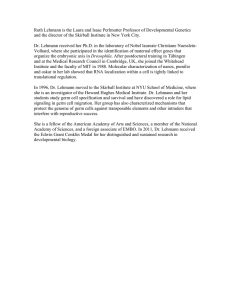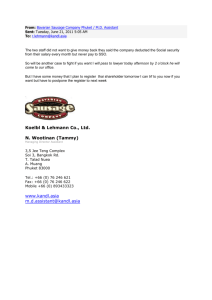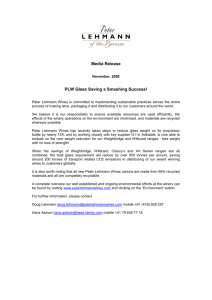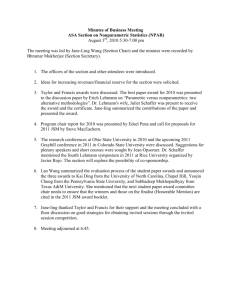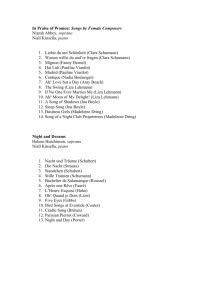Smith College Alumnae Oral History Project Kate Lehmann, Class of 1978
advertisement
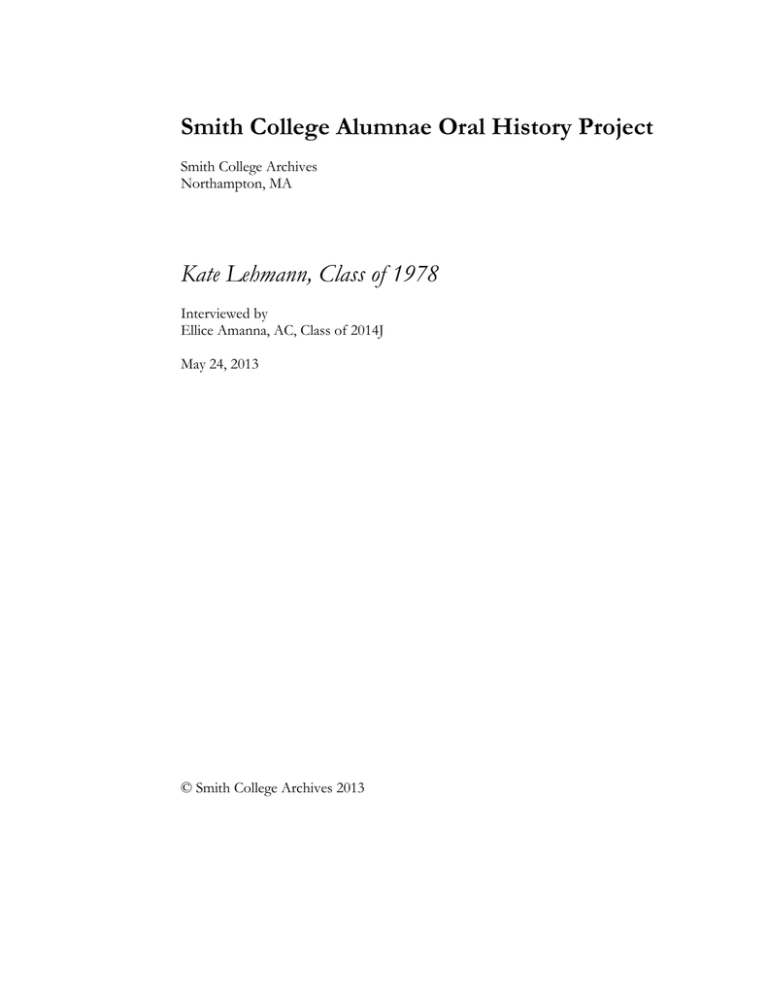
Smith College Alumnae Oral History Project Smith College Archives Northampton, MA Kate Lehmann, Class of 1978 Interviewed by Ellice Amanna, AC, Class of 2014J May 24, 2013 © Smith College Archives 2013 Abstract In this oral history, Kate Lehmann recalls the Women’s Movement and lesbian activism as significant pieces of the political backdrop during her Smith years, as well as her experience living in a Green Street rooming house. She speaks of the many ways Smith prepared her for the future by helping her develop analytical thinking and self-confidence. Restrictions None Format Interview recorded on miniDV tapes using a Panasonic DVX-100A camera. One 30-minute tape. Transcript Transcribed by Janet Harris with Harris Reporting. Bibliography and Footnote Citation Forms Video Recording Bibliography: Lehmann, Kate. Interview by Ellice Amanna. Video recording, May 24, 2013. Smith College Alumnae Oral History Project, Smith College Archives. Footnote: Kate Lehmann, interview by Ellice Amanna, transcript of video recording, May 24, 2013, Smith College Alumnae Oral History Project, Smith College Archives. Transcript Bibliography: Lehmann, Kate. Interview by Rachel Klinger. Transcript of video recording, May 24, 2013. Smith College Alumnae Oral History Project, Smith College Archives. Footnote: Kate Lehmann, interview by Ellice Amanna, transcript of video recording, May 24, 2013, Smith College Alumnae Oral History Project, Smith College Archives, p. 3. Lehmann, Kate, interviewed by Ellice Amanna Page 1 of 11 Smith College Alumnae Oral History Project Smith College Archives Northampton, MA Transcript of interview conducted May 24, 2013, with: KATE LEHMANN by: AMANNA: ELLICE AMANNA So this is Ellice Amanna and I'm conducting an interview with Kate Lehmann on May 24th, 2013 for the College Alumnae Oral History Project. Thank you for participating. So you're back for reunion. Welcome back. LEHMANN: Thank you. AMANNA: This isn't your first reunion. You’ve come back? LEHMANN: A couple of times, yeah, yeah. AMANNA: Okay. And can you say something about why you do that, what's important about it to you. LEHMANN: I like – Smith was a really important place for me in terms of being a really formative place. I'm really supportive of the college. And I just like to every once in a while come back and kind of experience it in person. I'm involved with the alumnae group in my home state and so I have a connection that way with other alums. But I just like to sort of see what's actually going on here and feel the place too. I think that's important. AMANNA: Yeah. Do you remember when you were selecting Smith what you were thinking, why you chose to apply here? LEHMANN: Why I chose it? You know, it's funny, I have a vivid recollection of coming to visit. My mother went to Holyoke and I – and she was going to a reunion. We were on my little college tour. And I had a friend who was in her first year at Smith and so I came – I went to visit the college. I have family connections to the college so I wanted to visit it. And the night – my mother and I came to Northampton to have dinner with an uncle the night before I was visiting the school, and it was the night of the Billie Jean King/Bobby Riggs tennis match. And we were sitting in some restaurant and my uncle and I would get up periodically and go into the kitchen to find out what was happening with the match. And then of course when Billie Jean King won there was this huge Smith College Alumnae Oral History Project Smith College Archives Lehmann, Kate, interviewed by Ellice Amanna Page 2 of 11 demonstration on campus which I don't know if it's been documented, but it was a sort of impromptu celebration on campus and march and stuff like that, and I thought, well, that's really fun. And then I stayed with my friend and really just connected. I think I just felt at home. I just felt like this was a place I could be comfortable, that I could excel that, you know – and so I opted for it when I got accepted. AMANNA: So was it important – did you only apply to women's colleges? LEHMANN: No, no. AMANNA: Was that an important part of your – LEHMANN: It was not actually. I didn’t give that a lot of thought. I applied to several other schools. I think they were all co-ed. And I don’t – you know, I wouldn’t – you know, I think I was a – you know, I had a lot of confidence and I didn’t consider myself particularly a feminist, but turned out I was. I didn’t label myself that way. So anyway, so I felt – I had been in a co-ed public high school so this was a big switch, but it was – it felt just fine. AMANNA: Do you remember arriving at Smith and what your first – what that felt like to be a new student here? LEHMANN: Yeah, I do. I was one of those people who went from being the top of their class to like getting my first C, and I remember just being devastated. It was like, what? Yeah. Suddenly everything gets sort of reordered. And I didn’t want to be a real nose-to-the-grindstone kind of student. I wanted to also have a life while I was here too, so I was kind of a B student. But yeah, so there was competition. There was a lot of – I think also the thing that – and I feel this when I am with alumnae groups as well – which is just being around really smart, confident, thoughtful women is just sort of an exhilarating experience, and just a lot of sort of kindred spirits. So it was – yeah. I mean as I say, I wasn’t a great student but I kind of took to the place. AMANNA: So over the years you’ve had – kept an attachment to the school through reunions and the Quarterly. Do you have a sense of how the student body or just Smith in general has both stayed the same and undergone change? Do you have a sense of that? LEHMANN: A little bit. I don’t think – I mean part of it is, you know, I do read and talk with people, but I think, you know, one of the things that's changed certainly is there's a much more – much more diverse student body than there was when I was here. It was pretty unusual for there to be African-American students. I remember Martin Luther King, Jr.'s daughter was in, if not my class, right around my class, and she was one of the few black faces on campus. Smith College Alumnae Oral History Project Smith College Archives Lehmann, Kate, interviewed by Ellice Amanna AMANNA: Page 3 of 11 Right, right. So you’ve seen some change in that. I mean that was -- LEHMANN: Seen a change in terms of that diversity. I think there's – I – in a lot of ways I think the student body is much more ambitious and much more – they take on stuff that I don’t think we would have ever thought to take on. I mean just kind of amazing accomplishments. AMANNA: Well, you were here at a relatively politically active time, especially for women. What was your level of political awareness and activism and your sense of how that was operating on campus? LEHMANN: Well, it was mid-'70s, and there was a lot of emphasis on the women's movement, and within that a lot of emphasis in Northampton on lesbian issues. AMANNA: And what do you mean emphasis in Northampton? What was going on around town? LEHMANN: Well, Northampton was sort of the mecca. I always refer to it as the center of the lesbian universe at that time. And there was both a lot of academic work around sort of political thinking about different sort of strands of lesbian – I mean lesbianism was really politicized, and there were lesbian separatists and radical feminists and socialist feminists, and so there was – I don't know. There were lots of factions and lots of sort of debate, political debate. AMANNA: Yeah. Around pride and other issues. LEHMANN: Yeah. So there was a group of radical lesbian separatists who were sort of kind of a core group in Northampton, not necessarily with the college but in the community, and I had friends in that group and -AMANNA: Who weren't necessarily students -- LEHMANN: Right, right. I was involved on campus. We tried to revive a lesbian kind of affinity group, student group, to help provide – I think mostly what we did was to provide speakers and sort of resources for – because at that time coming out was still a really big deal, and it could cause problems in houses and things like that. So we organized in order to be able to furnish some speakers and that sort of stuff. AMANNA: And was the administration, the relationship with the administration? Was it hostile? Because a lot of women talk about the challenges they had in those years still. LEHMANN: Yeah. It was not – yeah. It wasn’t overtly hostile but it was uncomfortable. AMANNA: So as students you were trying to step in and sort of provide some support? Smith College Alumnae Oral History Project Smith College Archives Lehmann, Kate, interviewed by Ellice Amanna Page 4 of 11 LEHMANN: Yeah. And deal with some of those issues of what we perceived as being a hostile administration. AMANNA: Were you meeting with administration people over issues? LEHMANN: You know, I think we did, although I have a – I don't know if I was involved in doing that or not, but I know we were trying to do that as a group. AMANNA: And what about the rest of the student body, what was the climate around lesbian issues at that time? LEHMANN: You know, I'm trying to think. It was kind of mixed. I mean – AMANNA: I mean did you feel marginalized or did you think -- LEHMANN: A little bit, yeah. AMANNA: You had friends so it wasn’t -- LEHMANN: Yeah. On the other hand, there were always – there was a pretty lively social scene too, so we had dances, and there were a couple of bands that played in the valley that – in fact, I saw that Deadly Nightshade is playing tomorrow night and I was just like oh my god. We go into Boston to see them. So there was a pretty lively social scene, and then on the campus we all kind of supported each other. AMANNA: Were you out when you came or did that – LEHMANN: No, no. AMANNA: – happen in school? LEHMANN: That happened while I was in school. AMANNA: So how was that? LEHMANN: Well, it was obviously a huge experience for me, for my parents, who were not surprised but not happy. It's sometimes hard to know, because I was in love for the first time too and so it's like which one – you know, what's the most sort of – yeah – what's the biggest deal here. I did end up moving off campus. I lived on campus for two years and then when I petitioned to move off campus it was because I wanted to live with my partner then who had graduated, and so – I was just recalling this with my classmate – and in my petition, because you had to write a letter and explain why you should be given permission to move off campus because they didn’t encourage it, I explained that I was a vegetarian and I was a lesbian and those were two things that really I think that the administration just really didn’t want to hear so, you know. Vegetarianism was a problem too. Smith College Alumnae Oral History Project Smith College Archives Lehmann, Kate, interviewed by Ellice Amanna Page 5 of 11 And so I lived off campus with a couple of classmates, and then my senior year I actually lived in what was then a lesbian separatist rooming house on Green Street. AMANNA: On Green Street. They're about to tear it down. LEHMANN: Which I noticed was being fumigated, and I thought, well, it should have been while I was there. It was a really funky place. AMANNA: Just took the tour yesterday. LEHMANN: Oh, yeah? AMANNA: They're about to tear it down. Yeah. LEHMANN: I lived in there for a year. I think I paid $86 a month for rent. I was the first Smith student to live there. AMANNA: Really? What year? LEHMANN: Would have been 1977 I think. Yeah. And the only reason I was allowed to move in, because you sort of had to be vetted by this really hardcore group – it was a little frightening when I think back on it. AMANNA: That must have been really intense. LEHMANN: And the only reason I think they allowed me to move in there was because my expartner, my ex, had been kind of a well-respected person in the community after she graduated from school, and they sort of said, okay, okay, we'll let her in. So I lived there for a year, and that was kind of a -AMANNA: You had an intense experience. LEHMANN: Yeah. AMANNA: So it's understandable you have a lot of attachment to this place through those experiences too. LEHMANN: Yeah. AMANNA: What was your major? LEHMANN: I majored in religion. AMANNA: Oh. And what did you have in mind? Was it just an interest or did you have a career path in mind? Smith College Alumnae Oral History Project Smith College Archives Lehmann, Kate, interviewed by Ellice Amanna Page 6 of 11 LEHMANN: I did not have a career path in mind. It was an interest. It was kind of a good catchall liberal arts major, and I could cut across history and art and various things, and so I did that. And then I think it was the summer after my junior year I interned at – I've always been interested in broadcasting, and I interned at the PBS station in Springfield for the summer and sort of hooked on that, so when I graduated then I actually went and worked in television for a long time, for many years. AMANNA: So has that been your career then? LEHMANN: Well, for about 30 years I worked in, yeah, in broadcasting, and then changed careers more recently, and now – AMANNA: And what do you do now? LEHMANN: Well, I kind of do two things. I work – about ten years ago my father asked me to come and work in his business and learn – he's a mining consultant, a geologist, and I said, as long as it's the business end of things that's okay, because I'm not a geologist. So he wanted somebody in the family to be more acquainted with what – because of the long-term nature of mining projects and things. So I've been doing that, and then I also went back to school for a second master's degree in addiction counseling, and I – AMANNA: Interesting. LEHMANN: So I spend part of my time working doing counseling and most of my time these days working with the finance and administration in our – AMANNA: Okay. So just looking back reflecting on your academic and social preparation from your experience here, how did that translate once you got out of Smith? Do you feel like Smith was good preparation for the world as you found it? LEHMANN: Yes. I think it did two really important things for me. It really helped me learn how to think, how to analyze things, how to approach problems in a kind of holistic way and be able to come up with good solutions, good approaches to things. I think it also gave me confidence to be able to walk into any – to take myself seriously and to be able to walk into any situation and sort of demand the kind of respect that I think that all women deserve but sometimes doesn’t happen even these days. AMANNA: Yeah. (indiscernible) done important things. LEHMANN: Yeah. AMANNA: I mean interpersonal skills and – Smith College Alumnae Oral History Project Smith College Archives Lehmann, Kate, interviewed by Ellice Amanna Page 7 of 11 LEHMANN: Yeah, very much. And, you know, and I always had a sense of curiosity, and I think the other thing we found in our oral history work back in Minnesota was there is a real theme of service that goes through. I think there is that idea that you need to be engaged in the world and you need to take responsibility and you need to do what you can and be of service and help make the world a better place. And that's something that I think we all get out of this place. AMANNA: Yeah. You’ve carried that with you. You do a lot of community – LEHMANN: I do a lot of community work. I do a lot of nonprofit board work and things like that. So yeah, I do have that sense of wanting to be in the world and of the world. AMANNA: And it sounds like you had a pretty active – you weren't just going to class, you had an active – LEHMANN: Well, I had some – AMANNA: You had some – LEHMANN: I was doing some other things. AMANNA: – some real world work while you were here. LEHMANN: Yeah. AMANNA: Do you have memories of either rituals or house life that just have stayed with you that are important to you or that you connect with your Smith experience? LEHMANN: You know, not so much house life because of that only two years in the dorms. But I still thrill to the idea of Mountain Day. And I love now when we get an email that says, guess what, it's Mountain Day at Smith. It's like, man, I wish I could take the day off and go off into the woods. AMANNA: Great idea. LEHMANN: I like just that spontaneity and that kind of thing. Yeah. But, you know, that's still there but – AMANNA: Yeah. And do you have friends who you’ve stayed in touch with and see or not – LEHMANN: Not so much. I have a few people that I have sort of a Christmas-card relationship with, but I have not stayed in touch and there isn't anybody that I knew when I was here that is in my local area. AMANNA: So when you come back for reunion and you're on campus with everyone, what are the kinds of things that you talk about? Do you share memories? Smith College Alumnae Oral History Project Smith College Archives Lehmann, Kate, interviewed by Ellice Amanna Page 8 of 11 LEHMANN: Yeah, yeah. We talk about sort of – kinds of things we're interested in now I think is really pretty fascinating. I have found the last couple of times I've done this that it's not so much – I don’t necessarily see a lot of people that I know from when I went to school. I meet all kinds of really interesting people that I never met when I was here. And so just kind of hanging out and talking to people who – there's some really interesting, accomplished, ambitious, compassionate people and -AMANNA: You're finding that here, right? LEHMANN: Yeah. AMANNA: Just doing these interviews are like wow. LEHMANN: Sure. Yeah. AMANNA: I want to keep in touch with you. LEHMANN: So it's just really fun just to kind of have those kinds of conversations about what's important to people. AMANNA: Yeah. So do you have pride in being a Smithie? LEHMANN: Absolutely. I had to go get a new t-shirt while I was here. AMANNA: Okay. Well, we're going to wrap up. Is there anything else you'd like to add before we wrap up? LEHMANN: No. I think it's terrific that you're doing this. We had such a great experience with this at home, and I know that the college had received copies of all of our material, so it's a wonderful thing to be able to do it. AMANNA: That's great to have people out there doing that because it's so important. When you see undergraduates come in here they want to make that cross-generational contact, and it's a great way to do it, so thank you for that. LEHMANN: Yeah. Sure. AMANNA: Okay. Well, thank you for sitting with us. LEHMANN: Thanks. AMANNA: Okay. Smith College Alumnae Oral History Project Smith College Archives Lehmann, Kate, interviewed by Ellice Amanna Page 9 of 11 END OF INTERVIEW Transcribed by Janet Harris, July 2013. Smith College Alumnae Oral History Project Smith College Archives
